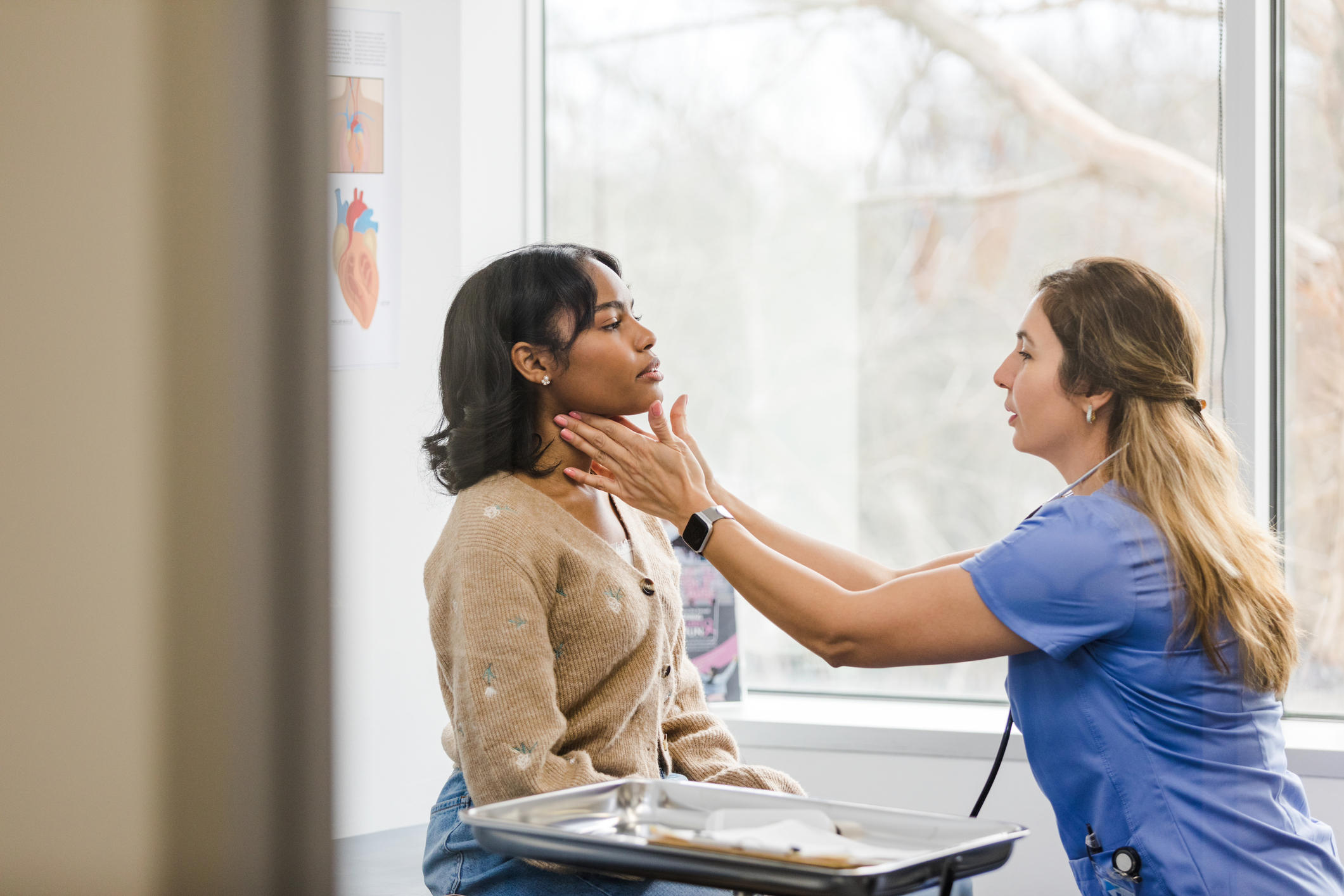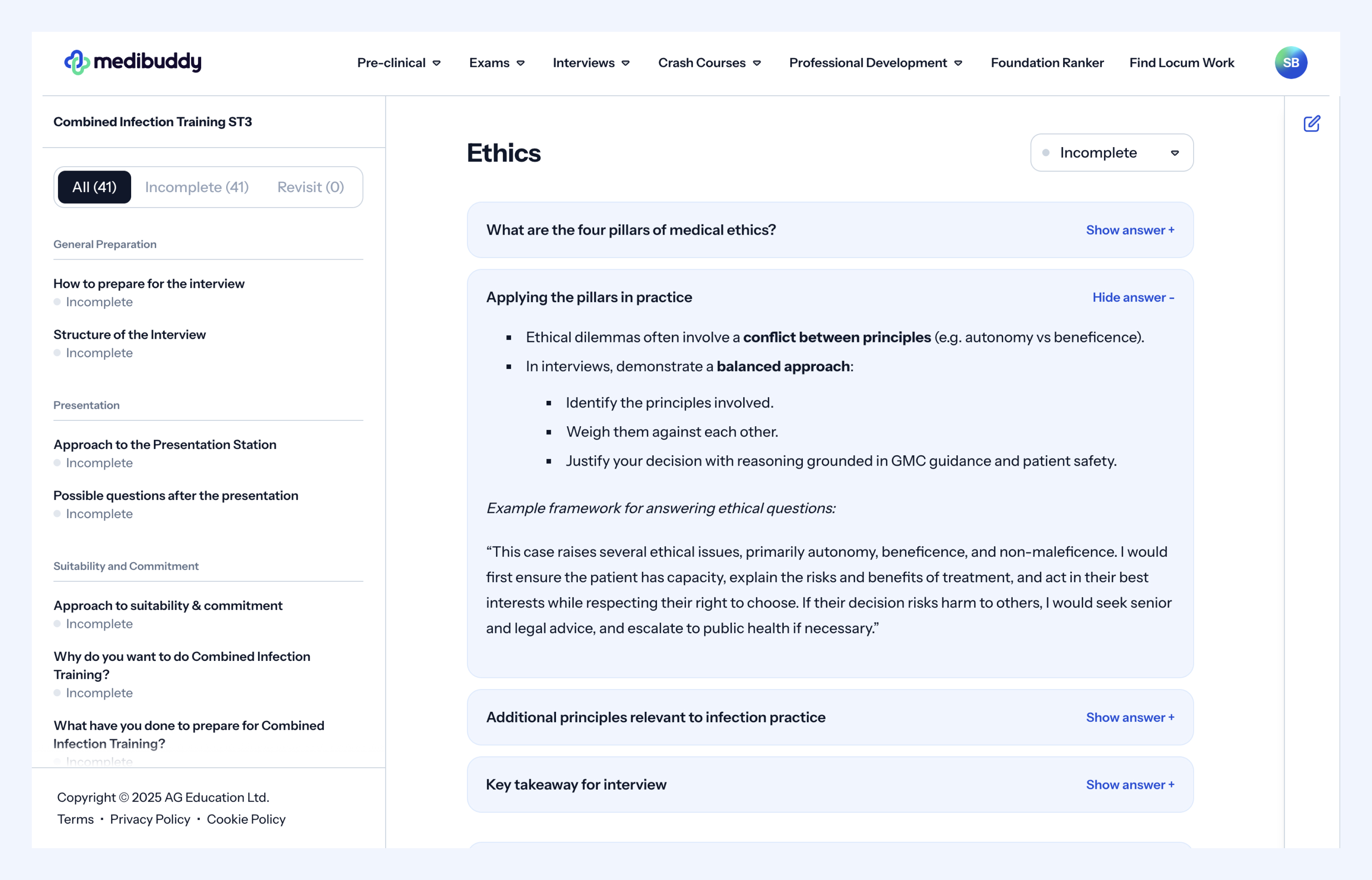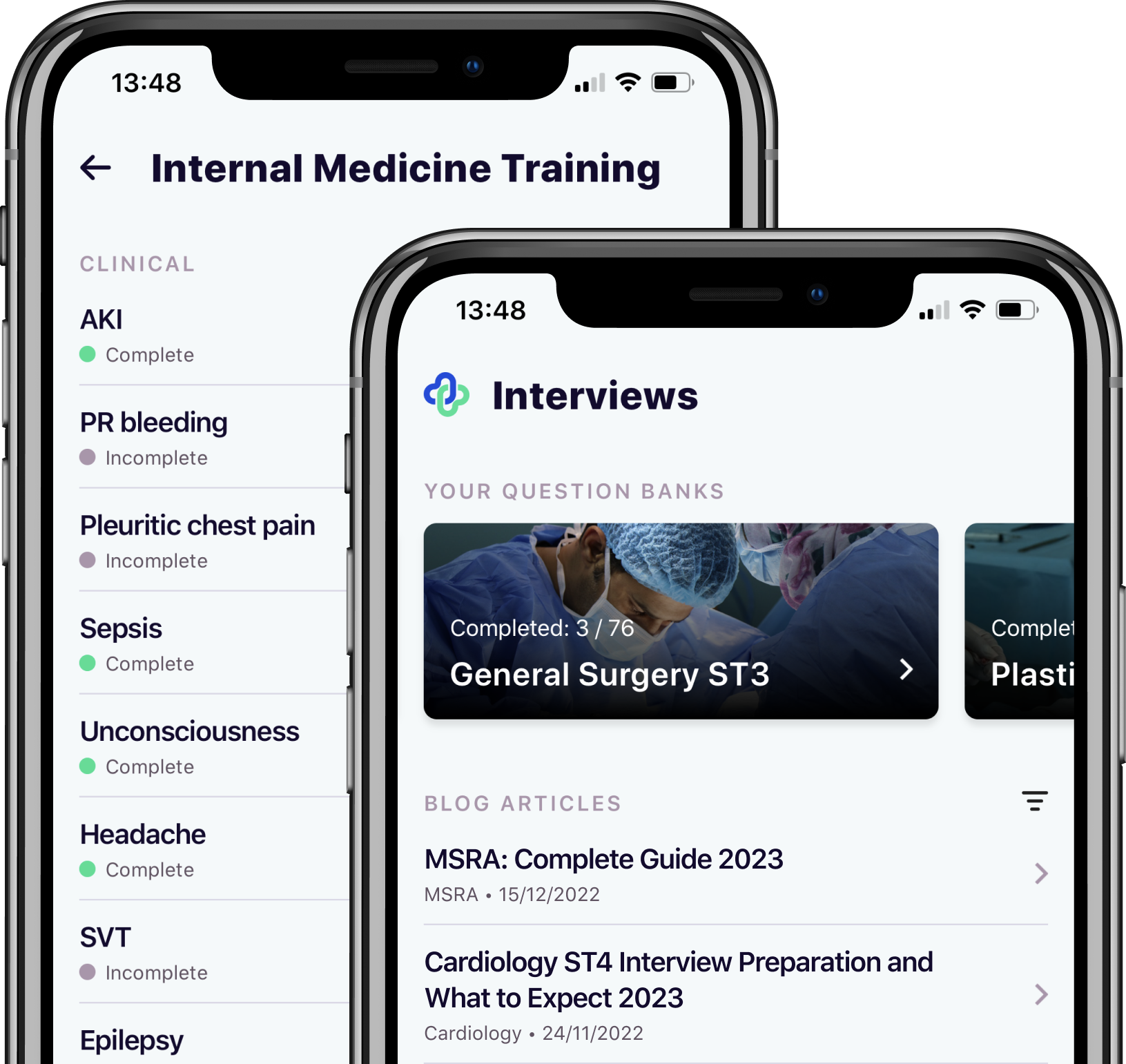
Combined Infection Training Interview ST3/ST4: 2026 Interview
The combined Infection training specialty recruits at both ST3 and ST4 levels. Combined Infection Training ST3 is a Group 2 training programme, whereas ST4 is categorised within Group 1. However, even though the application process is identical, the specialties require you to submit separate applications.
We have put together a Combined Infection Training ST3/ST4 guide to support you through the application process. The guide covers everything you need to know about the Combined Infection Training interview. This includes the key training dates for 2026, the different interview stations and the level of competition you can expect to face.
What do I need to know about Combined Infection Training?
Due to its varied nature, Combined Infection Training consists of four infection specialties. You can find the unique contents of each specialty below:
Infectious Diseases
A fascinating and fast-changing specialty, infectious diseases focus on laboratory and clinical skills, meaning doctors have the opportunity to see an extensive range of patients.
As a specialty, infectious diseases include a mixture of in-patient and out-patient work. The in-patient work is based in regional specialist ID Units, requiring doctors to manage patients with a variety of complex conditions. This includes community-acquired infections, TB, HIV, and bone and joint infections. Whereas, out-patient work revolves around travel-related conditions and tropical medicine.
The training programme has been revised recently, with infection trainees now spending two years on a combined infection training (CIT) programme. One year is ID-based, and one is spent attached to the microbiology laboratory and clinical consult rounds. After, trainees will take on another three years of higher specialist training in either ID, general medicine, microbiology or virology.
Medical Microbiology
Medical Microbiology involves all aspects of infection. Once, it was predominantly a laboratory-based role, overseeing diagnostic work, interpreting results and providing telephone advice to clinicians.
However, due to its evolving nature, the specialty has become more diverse. There’s now the opportunity to provide advice on how to control the spread of infection in hospitals and the community, give ward consults about complex or serious infection cases and lead in developing new infection services like outpatient parenteral antibiotic treatment (OPAT).
Medical Microbiology has similarities to Infectious Diseases, and there’s even the possibility of doing dual training across both specialties.
Medical Virology
Medical virologists diagnose and manage patients with viral infections. As a result, the specialty provides an opportunity to work in a mix of laboratory liaison, research, development and teaching.
During the programme, trainees will gain an idea of how to monitor resistance to antiviral drugs, manage respiratory outbreaks and make use of molecular-based tests to provide rapid diagnosis. As well as this, there’s the opportunity to manage patients with chronic viral infections. This includes HIV, hepatitis B and C, and respiratory virus infections.
With the emergence of new viral infections in recent years, the role of a medical virologist is constantly expanding, and medical virology is becoming an increasingly exciting specialty to become involved in.
Tropical Medicine
There are only a small number of posts available in tropical medicine. In ST4, these are linked to general internal medicine and medical microbiology or medical virology, in ST3. Most tropical medicine specialists end up in academic positions, work abroad, or manage the collaboration between UK-based and international tropical centres.
Again, there are similarities to infectious diseases. But, there are the following differences that you should be aware of:
- Trainees spend at least one year of their ID training at a recognised tropical centre in one of Liverpool or London
- An extra year of training must be spent working as a clinician at a recognised centre overseas
- Trainees must complete a face-to-face postgraduate qualification in tropical medicine
Combined Infection Training Key Dates
During the assessment of your Combined Infection Training applications, you will be required to upload evidence. You only have to do this once, during the window of 19 December 2025 – 2 January 2026.
Unlike other specialties, which allow you to book an interview slot, Combined Infection Training allocates a slot for you. This is to allow for the differing interview lengths while also considering the availability of the interviewers. The exact timings will become clearer closer to the time, but you can expect your Combined Infection Training interview to take place between 16 – 19 March 2026.
Combined Infection Training Application
The Combined Infection Training specialty recruits across two levels, ST3 and ST4. This means it contains both Group 1 and 2 programmes. As a result, there are key differences to most other specialties.
Firstly, if you are applying to separate levels, you will need to fill out two application forms. Although, these are identical in appearance, and therefore, the content should be duplicated. Also, both levels recruit through the same interview, dictating the scores for both programmes.
For more information about how the application process works, you can take a look at the ST3 and ST4 2026 Combined Infection Training person specifications.
The difference in levels comes with different eligibility requirements. To be eligible for Group 1 programmes, you must complete three years of internal medicine training (IMT) stage 1 programme or equivalent. Whereas, with Group 2, only the first two years of the IMT are required to be eligible.
The MRCP is an important consideration for Combined Infection Training. Both levels require you to have either successfully completed the MRCP(UK) Part 1 at the time of application and MRCP(UK) Part 2 by the offer date or completed the Irish Basic Specialty Training in Medicine and the MRCPI full diploma by the offer date to be eligible to apply. Being eligible for the specialist register in general internal medicine by the time of application is another alternative which will allow you to apply for Combined Infection Training.
Boost your Combined Infection Training Interview ST3/ST4 application score by Training in Teaching
Postgraduate teaching qualifications such as a PG Cert or PG Diploma can contribute up to 3 points to your Combined Infection Training application, but completing these courses can take a long time and may not be feasible before interviews.
A quicker alternative is attending a Live Teach the Teacher Course, which includes at least six hours of live, synchronous teaching and awards 1 point toward your application. Our 1-day and 2-day course options make it easy to find a format that fits around your schedule.
Combined Infection Training ST3/ST4 Interview
The Combined Infection Training interview process varies slightly depending on whether you’re eligible for Group 1 programmes in addition to Group 2. There are two stations for ST3 (Group 2), and four questions in total, with each taking around five minutes. When you consider the time between the stations, you can expect the interview for ST3 to last around 30 minutes.
Those interviewing for ST4 (Group 1) programmes face an extra station, which focuses on the medical registrar suitability of applicants. This station takes around ten minutes, meaning the ST4 interview runs closer to 45 minutes.
Station 1 Question 1 – Presentation
The interview’s first question requires you to prepare and deliver a presentation on the following topic:
‘An interesting recent development / research finding, relevant to infection specialties (including infectious diseases, medical microbiology, medical virology or tropical medicine)’
To prepare for the presentation, you should consider the following points:
- Select a presentation topic that’s relevant to infection specialties, as well as your application.
- It’s better to choose a topic that you’re knowledgeable about, rather than trying to deliver a complex presentation that you’re not confident in.
- Your presentation should not go on for longer than three minutes. A discussion will take place at the end of the timeframe, so make sure you get your main points across before then.
- You are not allowed to use any visual representations like PowerPoint to help with your presentation. But you are allowed to use smaller prompts like cue cards.
Station 1 Question 2 – Suitability & Commitment
This part of the interview focuses on your suitability and commitment towards Combined Infection Training as a specialty. This is your opportunity to build on the information you provided in the application form.
Station 2 Question 1 – Clinical Scenario
As you enter station 2, you’ll be given a clinical scenario to review. The brief will only be a couple of sentences in length. So, the rest of the window is a chance for you to mentally prepare to answer questions on the scenario.
The scenario itself will describe a hypothetical clinical situation in which you have become involved. When you’re preparing to give your thoughts on the clinical scenario, you should think about the following points:
- Your next steps
- What potential treatments you would administer
- How you would communicate with other people in the scenario. This might include patients, family members and colleagues
- Any further information you would collect
Station 2 Question 2 – Ethical, Professionalism & Governance
Here, you will be asked a question that revolves around the moral, ethical and legal aspects of a medical situation. Unlike the clinical scenario, you won’t have access to this question beforehand, so you’ll have no time to prepare your answer in advance.
Below is the type of scenario you can expect to find in the Ethical, Professionalism & Governance section of our Combined Infection Training ST3 Interview Question Bank:

Station 3 Question 1 – Medical Registrar Suitability (Group 1 / ST4 only)
Those applying for a Group 1 programme will explore the non-clinical aspects of being a medical registrar, with a primary focus on two of the Capabilities in Practice (CiPs) from the Internal Medicine Stage 1 Curriculum. These are:
- Managing an acute unselected take
- Managing a multi-disciplinary team, including effective discharge planning
You’ll open the station with a one-minute presentation describing your experience of managing the acute unselected medical take as a medical registrar. Use this time to give a clear overview of your roles, how long you’ve worked in them, the level of responsibility and supervision involved, the size and composition of your team, and the number of patients under your care.
You may also wish to briefly mention any relevant non-clinical responsibilities. Keep your delivery focused and well-organised, as you’ll be stopped after one minute, before moving on to follow-up questions about your experience.
Combined Infection Training Interview Scoring
For each interview question, two assessors will independently score your performance. They’ll use a standard scoring metric, providing you with a set of marks based on how you perform against the expected level. You can find the scoring framework below:
| Mark | Rating | Assessment |
|---|---|---|
| 1 | Poor | Not considered appointable |
| 2 | Area for concern | Performed below the expected level of a trainee applying to the specialty. Progression to a higher level training post will depend on performance in other areas |
| 3 | Satisfactory | Performed to the expected level of a trainee applying to the specialty and suitable for a higher level training post |
| 4 | Good | Performed above the average level and suitable for a higher level training post |
| 5 | Excellent | High performing trainee and suitable for a higher level training post |
Combined Infection Training Appointability
Like with most specialties, the sum of your separate interview scores will be combined, providing you with a raw interview score (RIS). However, due to the Group 1 and 2 interviews being slightly different, the appointability requirements also differ.
ST4 (Group 1) has five questions, giving you ten interview scores. Therefore, you can expect your RIS to be somewhere between 10 to 50. Before your application to a Group 1 programme can be considered appointable, your results must meet the following criteria:
- None of your interview scores can be 1/5
- A maximum of two of your interview scores can be 2/5
- Your RIS must be 30 or higher
As ST3 (Group 2) interviews don’t include the medical registrar suitability question, your RIS will consist of eight separate scores for the four questions. This means your RIS will be in the range of 8 to 40. For your Group 2 application to be considered appointable and to move on to the next round, you must meet the following points:
- None of your eight interview scores can be 1/5
- A maximum of two of your interview scores can be 2/5
- Your RIS must be 24 or higher
Failing to meet any of the unique criteria means your application will be considered unappointable, hindering you from progressing any further.
Combined Infection Training Competition Ratios
The 2025 competition ratios will give you an insight into what you’re up against in the upcoming recruitment round. In round 2, there were 154 applications for 36 Combined Infection Training ST3 posts. This resulted in a competition ratio of 4.28, meaning almost four people applied for each post. Combined Infection Training ST4 was more competitive, with 112 applications for 10 posts, resulting in a competition ratio of 11.20.

Take your subscriptions with you
Our mobile app allows you to access your interview and exam question banks wherever you are.




